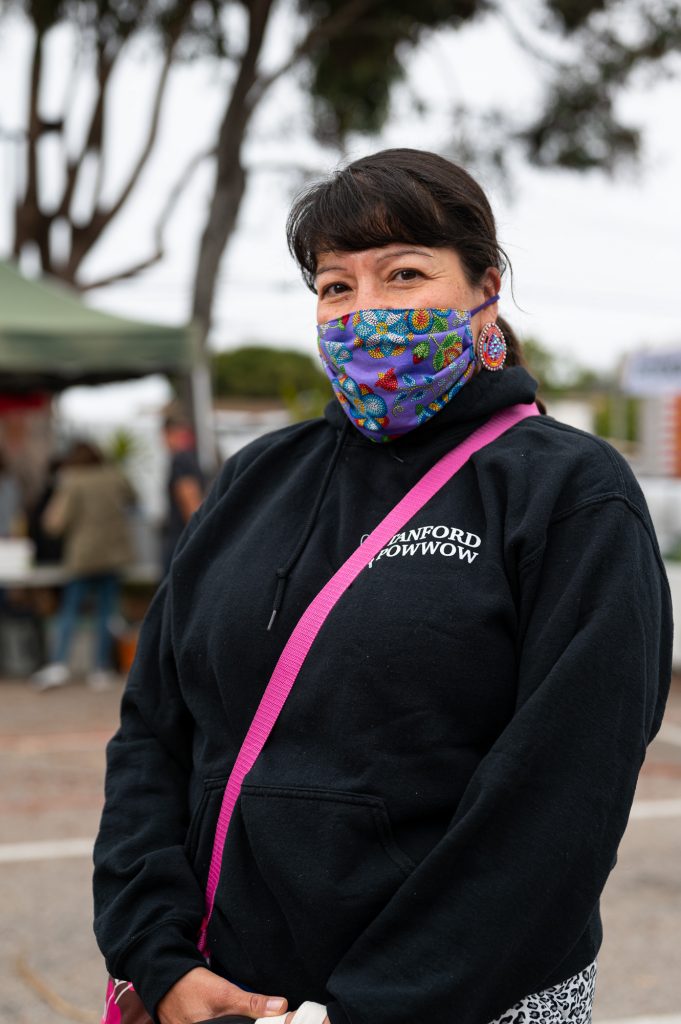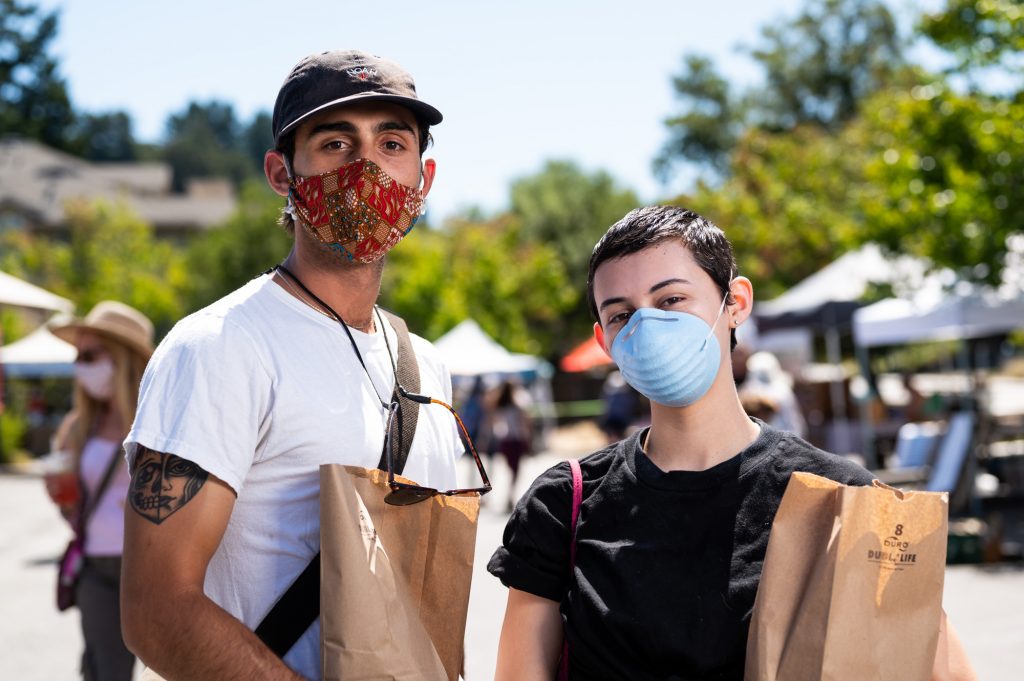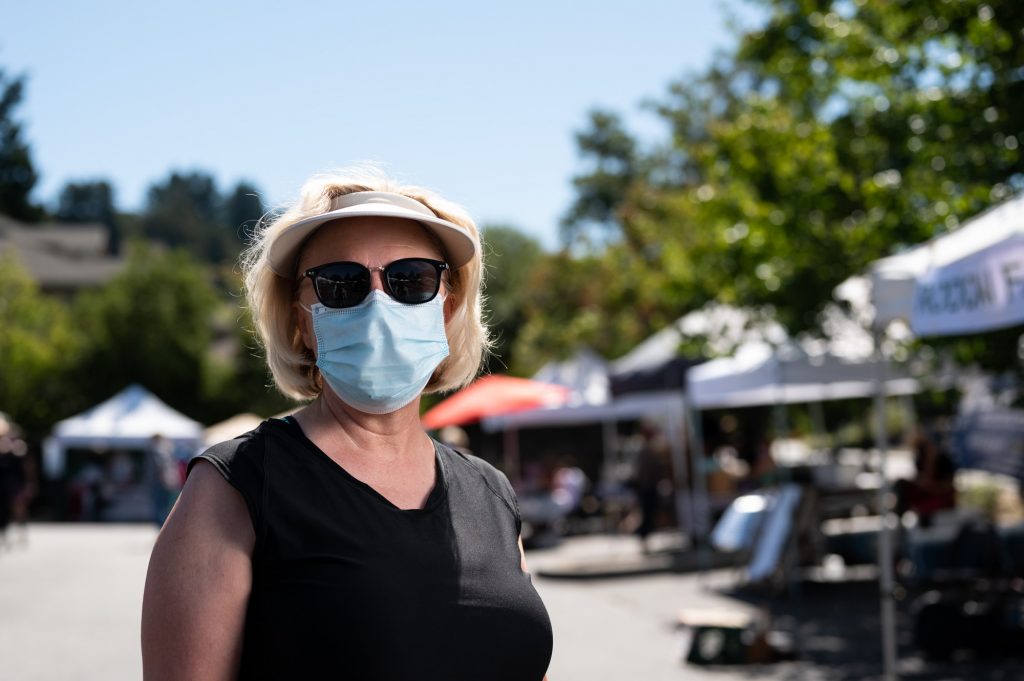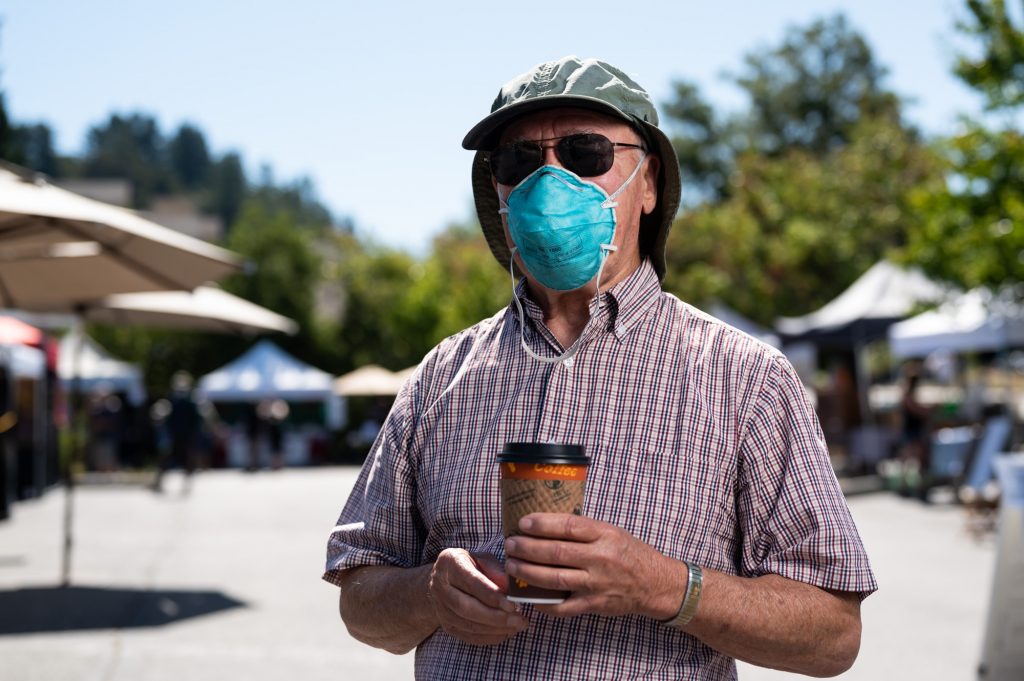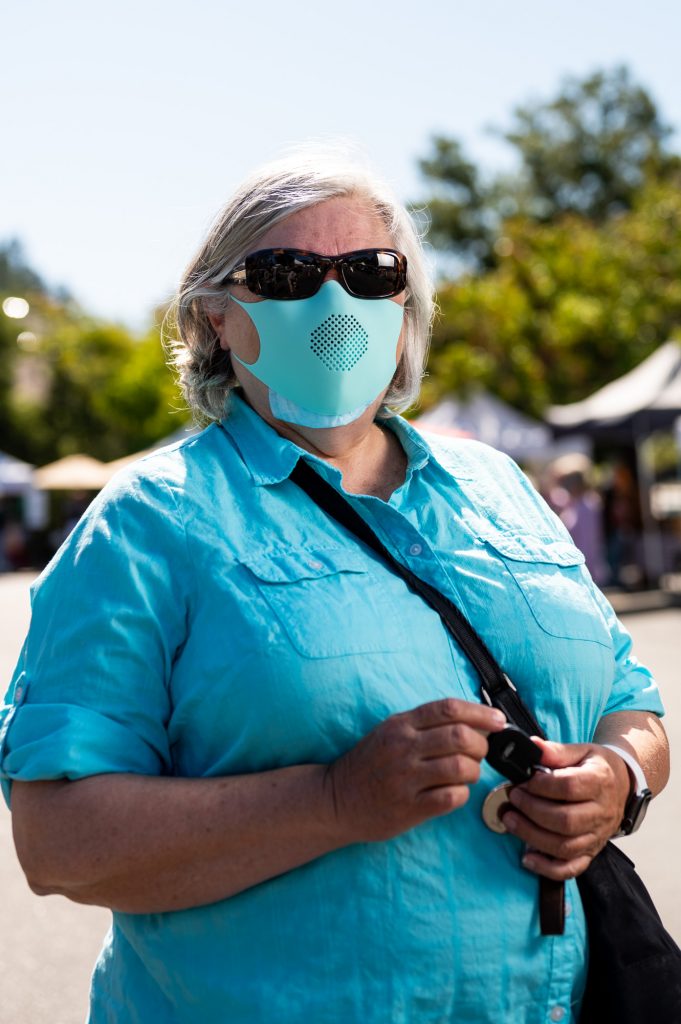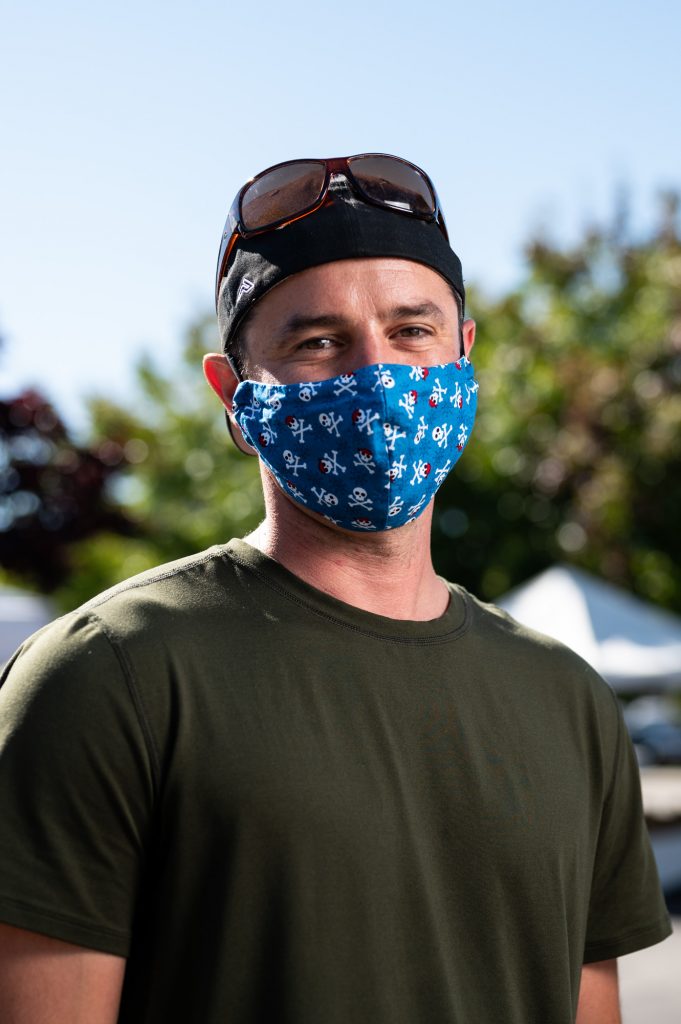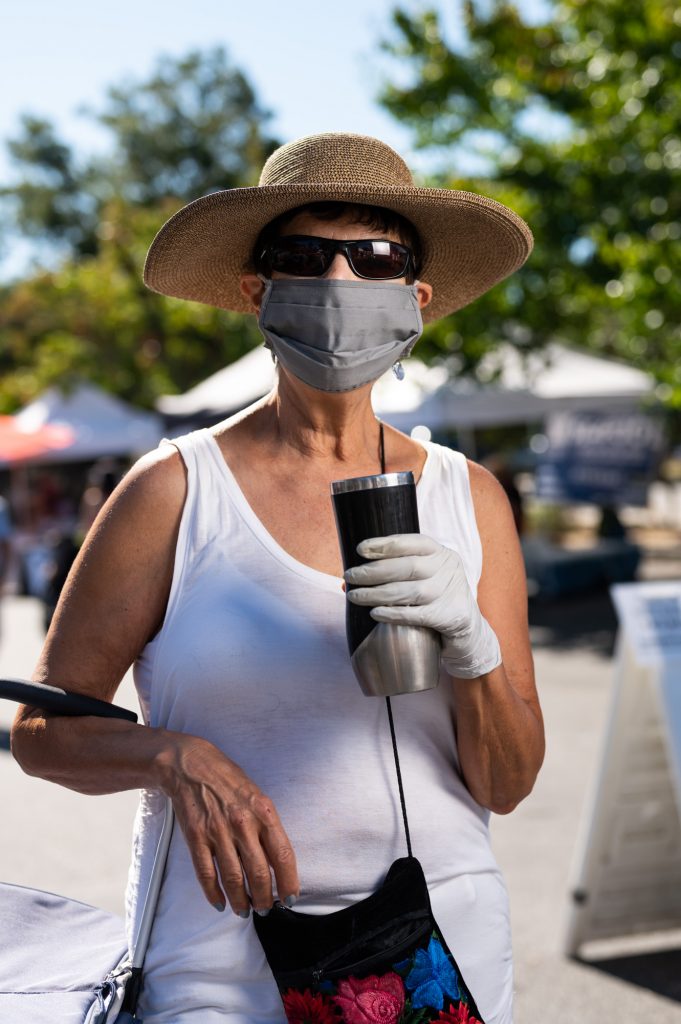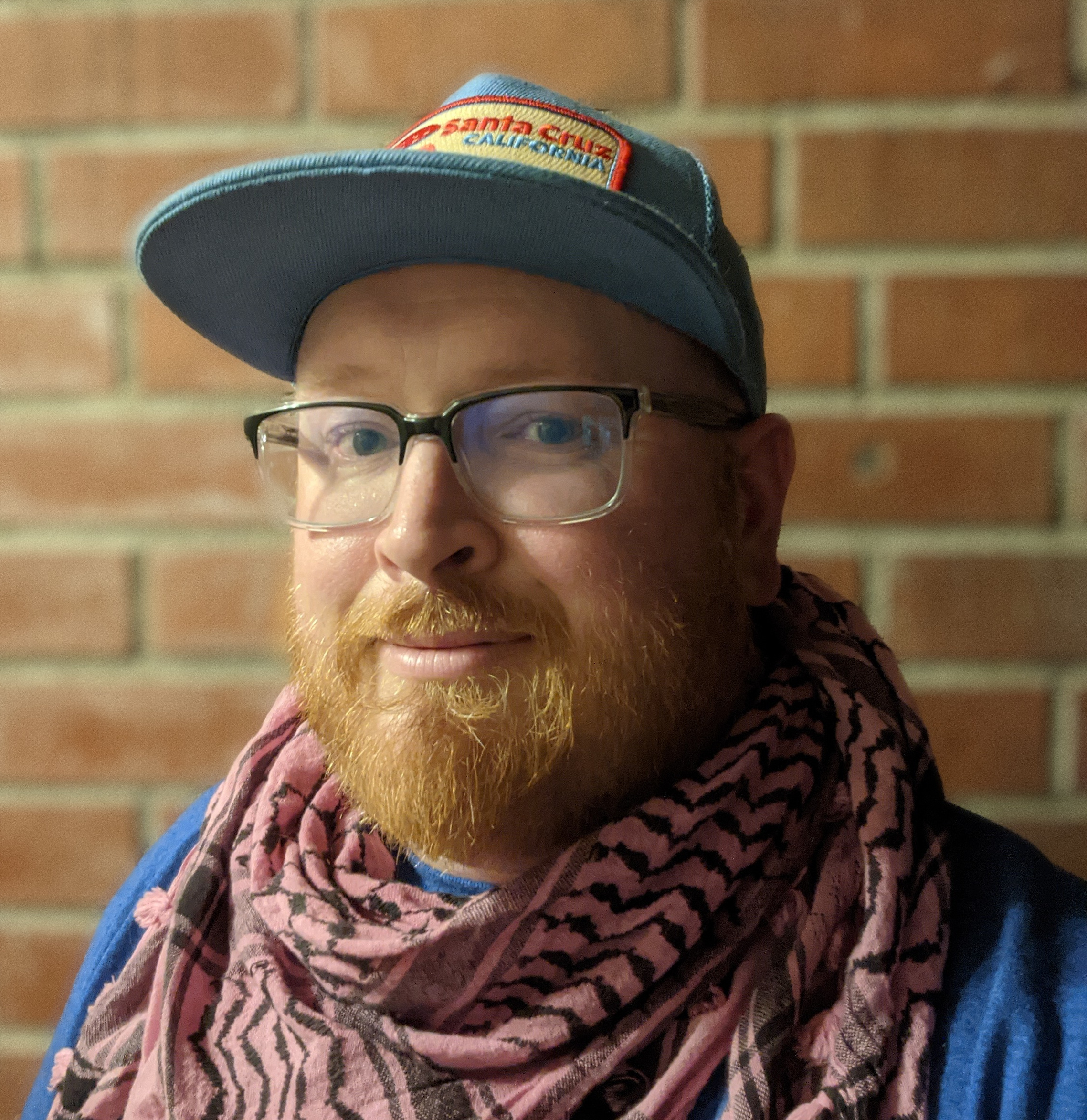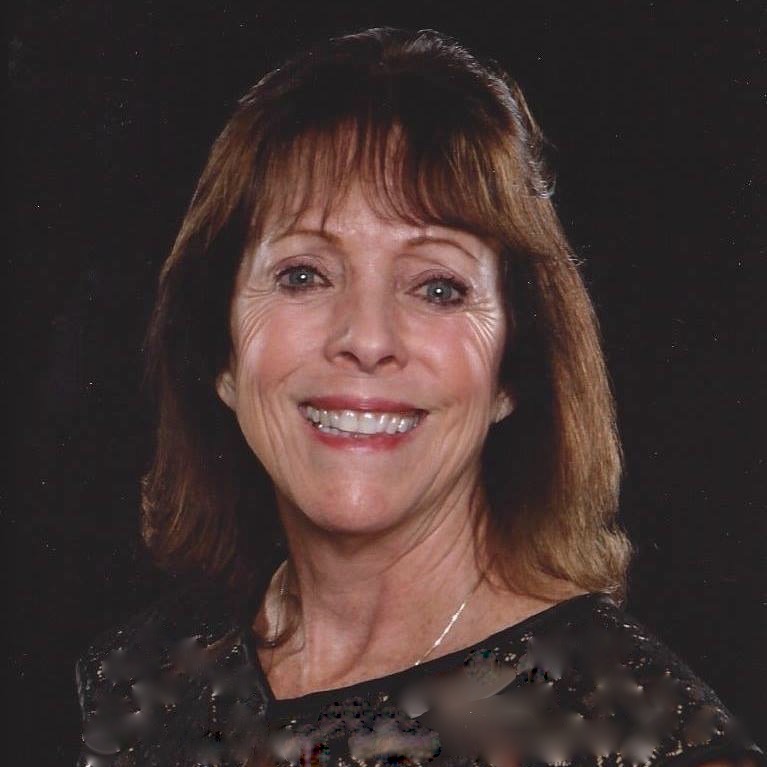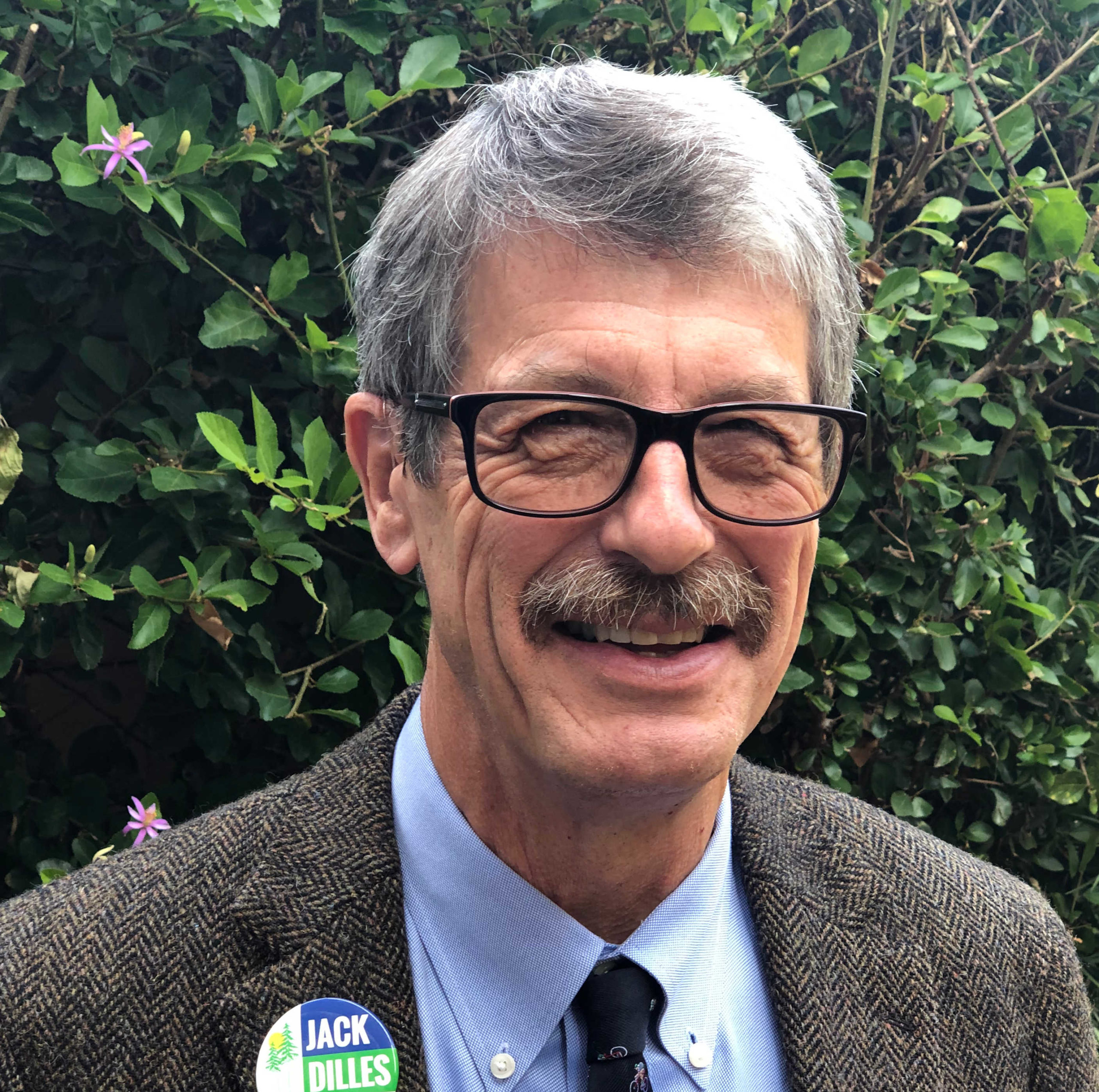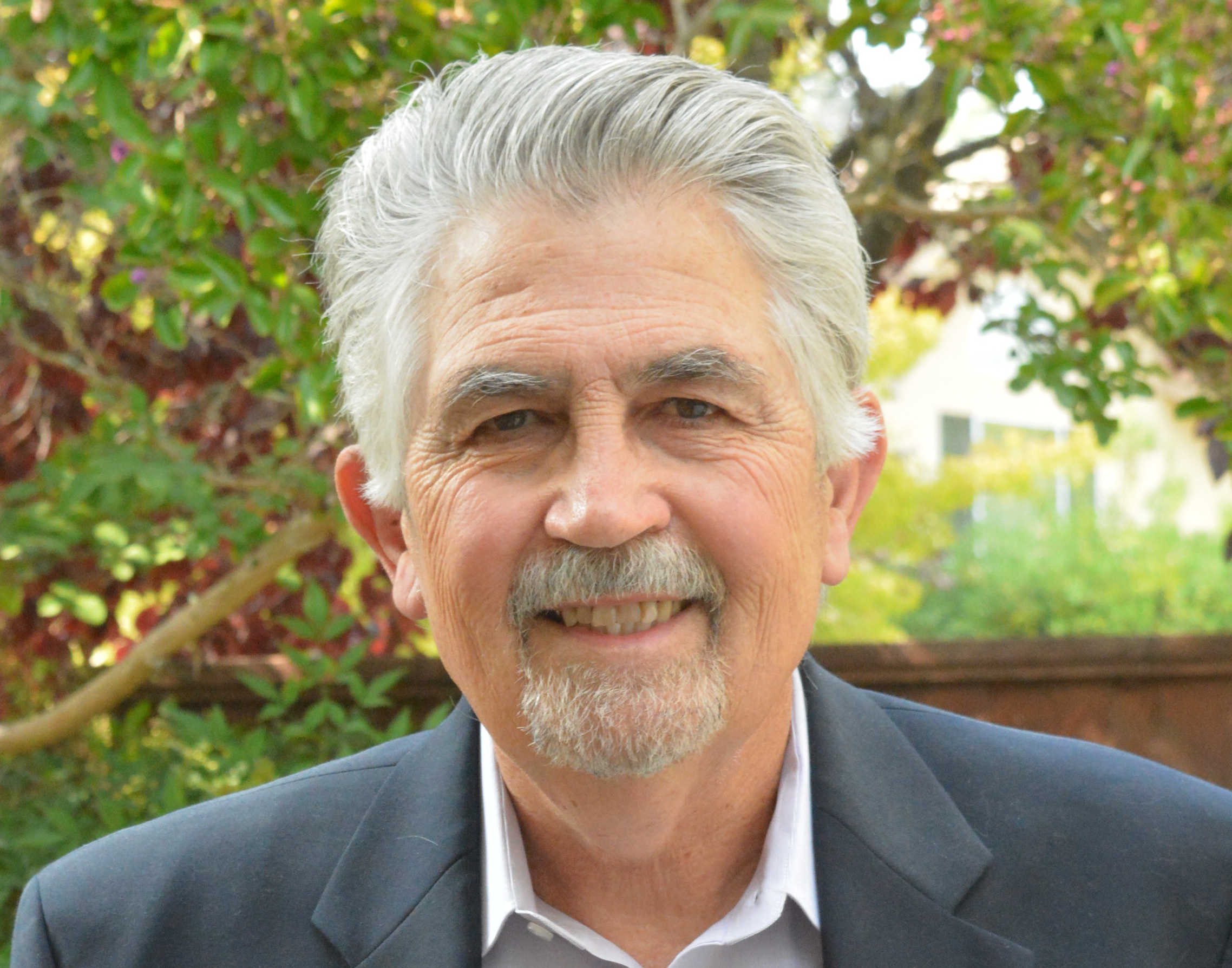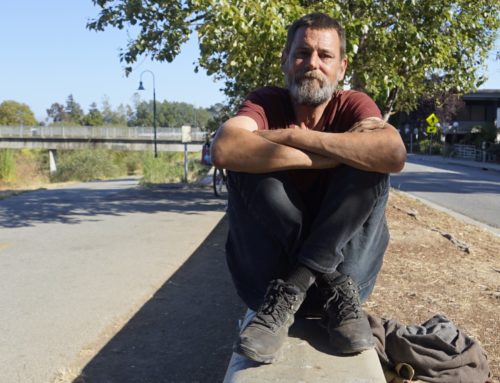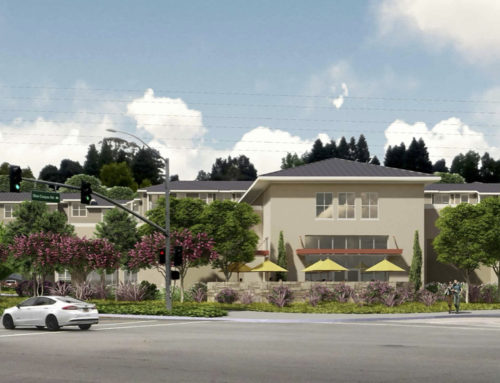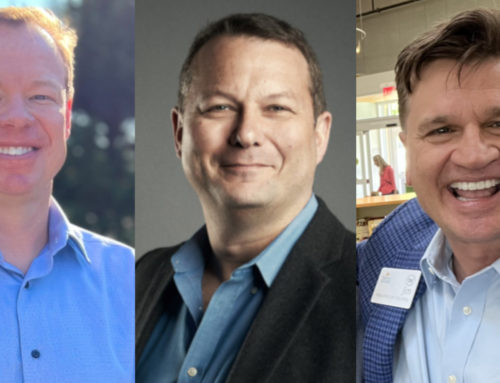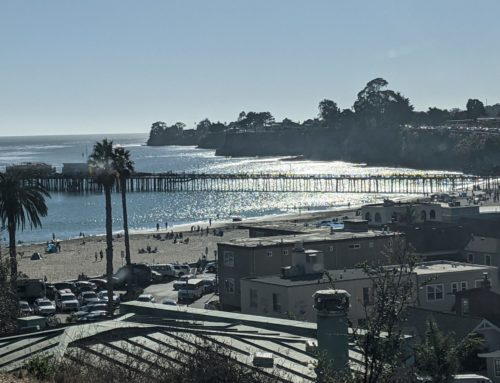Santa Cruz Local has interviewed and surveyed about 50 Scotts Valley residents in recent months to hear their priorities for the Scotts Valley City Council race. In this Episode 84, we press the candidates on residents’ chief concerns.
Candidates John Lewis, Donna Lind, Jack Dilles and Randy Johnson express their views on housing, local business, stabilizing the city budget, school funding and police. Transcript below.
Some key takeaways
Affordable housing: Scotts Valley’s inclusionary law requires developers in larger projects to offer 15% of units to people with lower incomes. The law only applies to the Mount Hermon Road and Scotts Valley Drive corridors.
- Challenger John Lewis said he is open to increasing that requirement to 20%.
- Incumbent Jack Dilles said he’d like the law to apply to more parts of the city.
- Incumbent Donna Lind said it’s fine the way it is.
- So did Incumbent Randy Johnson. Johnson said he’d like to see more proposals for studios and 1- and 2-bedroom apartments.
Local business support:
- John Lewis: City leaders need to attract and retain more businesses.
- Jack Dilles: Keep outdoor restaurant seating and outdoor business on Scotts Valley Drive.
- Donna Lind: Talk to business owners and maintain years-long relationships.
- Randy Johnson: Advocate at higher levels of government for more local business support.
On school support:
- John Lewis suggested a school bond measure. He, though, seemed to be unaware of a school bond measure on the current ballot.
- Donna Lind said the city can fund school facilities that the public can use, but that’s about it.
- Jack Dilles said the city council can’t do much more, except monitor potential COVID cases as schools reopen and be in contact with school district leaders.
- And Randy Johnson said he’s supportive of increasing property taxes to help pay for school expenses. However, he understands that’s not a city council decision.
Photos by William Duncan — Santa Cruz Local
Santa Cruz Local offers its elections-related work free as a public service. This podcast episode took months — and cost money — to produce.
Santa Cruz Local depends on memberships from people like you to make sure vital information can be available to all. Can we count on your help?
TRANSCRIPT
AD: This episode of Santa Cruz Local is sponsored by UC Santa Cruz. UC Santa Cruz tells its story every other week in its StoryCruz podcast. Listen to conversations about UC Santa Cruz news, research, breakthroughs, people and events. Find StoryCruz on Stitcher, iTunes, and Google Play.
AD: This episode is also sponsored by the Coastal Watershed Council. The Coastal Watershed Council works to transform the lower San Lorenzo River into a community destination. They inspire youth and families to explore, enhance and protect the river. Visit coastal DASH watershed DOT org to discover how to visit and volunteer.
[MUSIC]
KARA MEYBERG GUZMAN: I’m Kara Meyberg Guzman. This is Santa Cruz Local. In today’s episode, we’ll meet the four candidates for Scotts Valley City Council. And we’ll press them on the concerns we heard from you.
Since May, Santa Cruz Local has interviewed and surveyed more than 400 Santa Cruz County residents. We went to farmers markets, neighborhood groups and food bank distributions. And we held meetups online. We wanted to understand residents’ priorities.
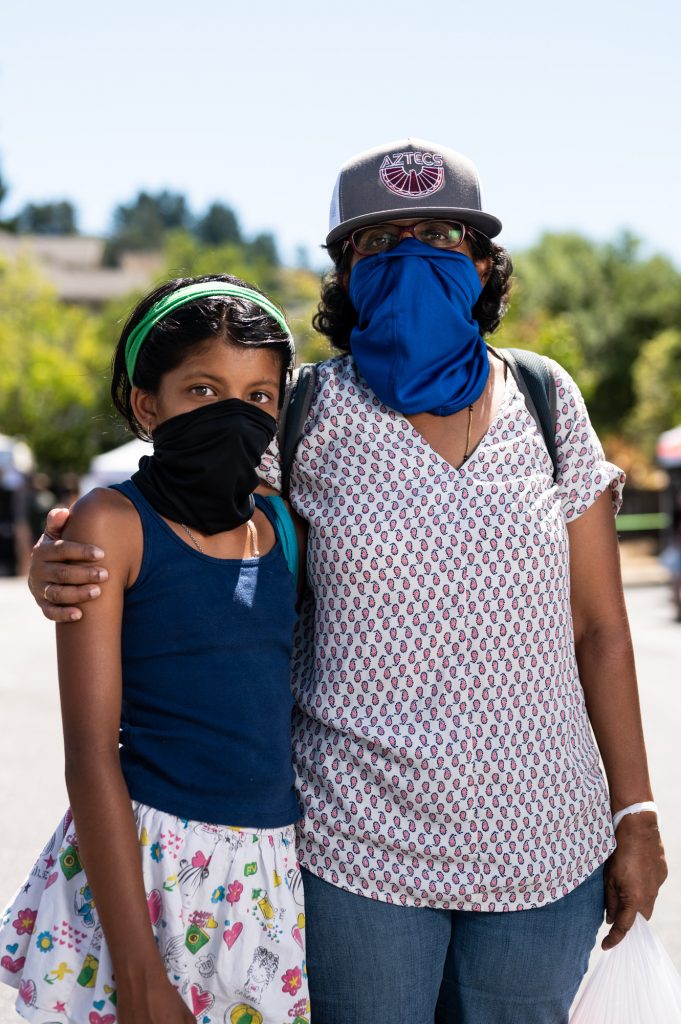
KMG: In July, I met Latha Amujuri at the Scotts Valley Farmers Market.
She’s an engineer at Oracle.
LATHA AMUJURI: So I’m one of the lucky few. I can work from home, and I’m very grateful for that.
KMG: She was with her daughters. She’s a registered voter. I asked Latha: What do you want Scotts Valley City Council candidates to talk about as they compete for your vote?
LATHA AMUJURI: Well, obviously, the COVID situation. That’s the first thing that pops to mind. But I have two school-going kids. So how the budget cuts are going to play out, especially when schools need more resources, not less. And how it’s going to just impact us in years to come not just this fall. But, you know, if we manage to make it to school, a) Is it going to be safe? Are we going to get the funding for all the extra resources? And does that mean that there’s going to be future cuts? So that’s one of the biggest issues for me.
KMG: Scotts Valley City Council does not directly fund Scotts Valley public schools. But there are ways that the council can support schools. You’ll hear from the candidates on this.
Elizabeth Weeks is another one of the roughly 50 Scotts Valley residents we heard from. She’s an accountant and a registered voter. I asked her what she wanted the city council candidates to talk about.
ELIZABETH WEEKS: Definitely schools. My daughter’s in first grade going into first grade. So there definitely needs to be more public funding for the schools and after school care. Also affordable housing in Scotts Valley. The median price is $900,000. And, you know, that’s just not feasible in today’s world. So affordable housing and public funding for schools.
KMG: What’s an appropriate place for development in Scotts Valley?
ELIZABETH WEEKS: Well, that’s a good question. You know, I feel like there’s still a lot of land left in Scotts Valley to develop. But I think just, again, more affordable housing for people. You know, not everybody can afford a $6,000 mortgage living in Scotts Valley with little resources.
KMG: In August, we held an online meeting for Scotts Valley residents. We hosted it with leaders from My Scotts Valley Magazine and the Local Voices Network. That’s a local journalism and community conversation program based in New York.
Jeffrey Hill attended. He’s a 32-year resident of Scotts Valley and he’s a registered voter. He said Scotts Valley is undergoing a LOT of changes.
JEFFREY HILL: There’s been an awful lot of housing built. The economics have changed. It’s a lot more expensive to buy a house here than it used to be. And one of the things driving this is, we’re running out of space. We’re pretty close to built out. I mean, there is room to, especially if we do multifamily housing, to put several hundred more housing units in town, but that’s about it. And so we have to stop and think about what that means for the town and where are we going to go.
I’ve been on an online survey panel for many years. A lot of these surveys will say, “How would you describe your community; urban, suburban, or rural?” When I moved here, I would have said “rural” every time and even up to about 10 years ago, I think I would have said “rural.” Now, every time, I say “suburban.” I grew up in the suburbs of Chicago. I think this town feels much more like a suburb than it used to.
[MUSICAL INTERLUDE]
KMG: Today, we’ll ask the candidates about five themes from our interviews:
Housing. Supporting local business. Stabilizing the city budget. School funding. And policing.
Let’s meet the Scotts Valley City Council candidates. They are John Lewis, Donna Lind, Jack Dilles and Randy Johnson. All but John Lewis are already on the Scotts Valley City Council. Voters get to pick three of the four candidates.
I asked the candidates to introduce themselves. And what’s one fun thing they like to do in Scotts Valley?
Here’s challenger John Lewis.
JOHN LEWIS: My name is John Lewis. I’m 41 years old. I am a systems engineer by trade, and I’m taking time off, to focus on raising my son. Seeing as how I’m new to Scotts Valley, you know, walking around and exploring the town and seeing all the beauty in the forest and the trees, and getting to know what Scotts Valley is all about is really interesting to me.
DONNA LIND: My name is Donna Lind. And I am 70 years old this year. And I’m very active in the community. I love to work out, to jog, to walk, I play golf, and just pretty much any outdoors activities are things I love.
KMG: Donna Lind was first elected to the council in 2008. She’s now running for her fourth four-year term. Scotts Valley City Council does not have term limits.
JACK DILLES: Well, I’m Jack Dilles, I’m running for Scots Valley City Council, of course. And I’m 68 years old. And a thing I love to do the most is ride my bicycle. I love to bicycle around Scotts Valley and around the county. That’s a big, big deal for me. And my occupation: My career was in government finance. I was finance director for a number of cities, Scotts Valley, Santa Cruz and Morgan Hill. I worked in county government and also for state government. I’m currently a city council member in my first term in Scotts Valley, and I’m also a part time consultant in government finance.
RANDY JOHNSON: My name is Randy Johnson. I’m the mayor of Scotts Valley. I’m 68 years old. I’m running for city council in Scotts Valley. My occupation is that I’m an insurance agent. I have been for over 30 years. And one of the things I like to do for fun is golf with my family.
KMG: Randy Johnson was first elected to the council in 1996. He’s served for 24 years.
KMG: OK, now for the people’s questions. Some residents are concerned about the pace of Scotts Valley’s recent development. They love Scotts Valley’s small-town rural feel, and they say their community is changing fast. What’s your vision for Scotts Valley’s growth? John Lewis.
JOHN LEWIS: I think we need to focus on what we can do to retain the businesses that grow up here, as well as building new opportunities for residents to live and continue to be residents here in Scotts Valley.
I’m a big fan of mixed-use developments, you know, business on the ground floor residential up above. It helps with density. It gives people, like, a walking experience, where they can, you know, step right out of their home, and walk to the businesses and places of recreation that they want to frequent. And it is a great quality of life to not have to depend on a car to get everywhere you need to go.
And Scotts Valley has a number of development opportunities where we could employ this type of development, whether it be you know, retail, or office space, and residential living, whether it be you know, condos or apartments, or, you know, even single-family attached homes. I definitely think that we need to look at what we can do to grow business and residents together to meet the demands of the future.
And I also think we need to figure out what business is going to look like in a post-COVID world, because we’re also going to need to be able to have, you know, more drive throughs, more open-air access for businesses. I really want to say that this is all going to wrap up and be done and we’re going to go back to life like it was before but there’s also the possibility that this could, sadly, be the new normal. And we need to figure out how we can enable businesses in what the world is, actually is.
DONNA LIND: I’m Donna Lind. And having been here 52 years, I understand. I remember when we rode horses down, you know, Scotts Valley Drive, Mount Hermon [Road]. And it’s always hard to see us grow. However, there are property rights, that, um, if a property is zoned for development or housing, we don’t really have, you know, the ability to deny someone just, you know, because many of us would like to keep that that undeveloped small town. We have the ability to turn down zoning changes, which we did. We’ve turned down just recently voted against one at Aviza because of the development that was proposed. And that would be a zone change. And there’s been another development that we had voted against. But if a property is zoned for housing, then we don’t have the right to say no.
If it were in my control, I would love to see, you know, the original idea that we had for a town center where there was retail and and parkways and, you know, little cafes, shops with some housing above it. That you know, that was my dream for the town center that could connect what we call the Kmart shopping center in Kings Village, and still leave park lands and still leave a good portion of the park, but have retail so that people who live in the area could get the things they need. When Kmart closed, I have people saying I have nowhere to get those essentials. We didn’t have a lot. But that was a loss felt by San Lorenzo Valley and Bonny Doon, the Summit, even people in Pasatiempo, Carbonara Estates, said they’d rather drive to Scotts Valley rather than deal with traffic going into Capitola.
So my ideal, I would love to see an area that we’d have a gathering place, and shopping and retail, not big box but something unique. Someone mentioned Santana Row, and that’s not exactly it. But that general idea on a smaller scale, more Scotts Valley, would be my dream.
KMG: Donna Lind mentioned the Town Center. It’s a development plan, years in the making, for the area near the Scotts Valley Library and the old Kmart. It calls for denser housing, shops, restaurants and a town green. Most of the plan has been slow to develop under the last several city councils. Here’s Jack Dilles. Same question. What’s your plan for growth?
JACK DILLES: Well, my vision is one of balance. I really also value a small-town feel or character for Scotts Valley. That’s part of why I moved here with my family 26 years ago. So the balance I’m speaking of is keeping Scotts Valley a small town. And we may define that different ways, but a small town that’s comfortable and isn’t overgrown, but also balance that with a certain level of growth.
A certain amount of growth is healthy. We need to grow to have a viable economy and environment. But I want to keep that in check. And so I see this as a balance of a small town allowing some growth, but being deliberate, and about what we do, planning it well. And when we, when we have development, that ideally it pays its way — pays for the infrastructure that needs to go with the development.
At the same time, we don’t have control over a lot of growth. The state, more and more, is taking over. We don’t have local control in lot of cases. The state is mandating that we do, that we grow. And that, of course, developers, owners of property have the right to develop their property in the way that it’s zoned. We can get into discussions when somebody when a developer wants to rezone the property. But in terms of if they’re staying with the zoning, they have the right to build.
KMG: You said, it’s necessary that the city have some growth, where and how would you like to see that growth?
JACK DILLES: I’m personally a fan of not building large, dense projects. To me, that’s different than the character of Scotts Valley. So I’d like, again, to try and keep it as a smaller community. So the kind of housing I favor, I’m a fan of expanding the inclusionary area. Inclusionary means that Scotts Valley, like many cities, allows, requires developers if they put in a housing project to build 15% of those homes as affordable. And there are formulas about what’s affordable for folks with basically you have less income than tied to the median income.
And right now, our affordable housing areas just are in two corridors, the Scotts Valley Drive corridor and the Mount Hermon Road corridor. I’d like to expand that to the city limits. And so that doesn’t necessarily mean you know, this area or that area, it’s saying that wherever projects go in, we need some affordable housing, because it really is a problem for young people in particular, but any of us to be able to acquire homes.
The other area that I really want to explore is to encourage accessory dwelling units or ADUs. We don’t really have very many, we’re now getting four to six requests a year. The state has recently, again, passed laws that mean cities can put less restrictions on ADUs that folks, it’s easier to build them now. Nonetheless, I think it’s something that doesn’t overwhelm the city. It fits into the character of neighborhoods. And I personally think that for those that can afford it, it’s a good investment for property owners.
KMG: Randy Johnson. What’s your vision for Scotts Valley’s growth?
RANDY JOHNSON: Thank you for that question. In terms of growth, it’s been I think, an age-old question that people in our city have always asked. When I first got on the council, we actually had horses walking up and down Scotts Valley Drive before it got fixed. I did go a long way in terms of fixing Scotts Valley Drive. And the presence of horses have diminished.
And so has the look of Scotts Valley, to a large degree, become more modern. But at the same time, keeping that small town character has been very, very important. I think we’ve done that.
On one hand, having a diverse housing element is extremely important, not only for the people that live here, of course, but also for the ones who might be teachers or policemen or firemen, who are trying to get a kind of a presence in our city to do their work and jobs. But if they are aced out as far as affordability of housing is concerned, then that’s really going to affect our ability to have a full-fledged vibrant community.
KMG: Can you sort of paint the picture for me more like what, what kind of Scotts Valley would you like to see?
RANDY JOHNSON: Sure. So you know, our general plan probably 25 years ago called for probably 16 [thousand] to 18,000 people, quite a bit more than the 12 [thousand] that we have right now. That has been diminished, because I think it reflects a vision that the person who asked his question shares, I think with most of the city council.
And with respect to the types of housing and you know, having a few more apartments for people to be able to fill those jobs that are needed. Because if you can’t get in and live in a place, then pretty soon, the effectiveness of our teachers and schools will be diminished. And we have to make sure that we have a balanced housing.
And it hasn’t been moderate. I mean, over the last 20 years, you kind of there have been ebbs and flows. In the last three or four years, I think you’ve seen some developments that you might look at and say that causes some concern. But at the same time, we’re also looking to have a balanced housing element.
KMG: Scotts Valley residents have told us that they want innovative approaches to support local businesses, especially during the pandemic. What more can the city council do to support small local businesses?
JOHN LEWIS: This is John Lewis, Scotts Valley City Council. I think we need to enable businesses to do more work in open air. I definitely think that if we can permit businesses to temporarily move their operations out of doors, or find new businesses that are outdoor operations that we need to focus on that very much in the near term.
DONNA LIND: This is Donna Lind. And I’ve been working with the [Scotts Valley] Chamber [of Commerce] for 15 years, we also our economic development committee has been really working hard, we’re all working directly with our local businesses. And we have been thinking outside the box. And we enabled outdoors, you know, seating for, for dining, and businesses, you know, really quickly in this process.
I think part of it is going to be continuing to work and be, you know, I’ve been out there visiting many of the businesses face to face actually passing on information. Not everyone’s on social media. So I’m making sure, putting phone calls in, you know. Everything I can think of I’m doing now.
And I think the other thing is, I’ve always been someone that’s been very approachable. So if someone comes up with an idea, I’m open to hearing it. And I think that it’s going to be really important for us to be out there marketing and supporting them as we pull out of the pandemic to get, you know, shoppers to come back in and help them find all the resources.
JACK DILLES: Well, this is Jack Dilles, again, for Scotts Valley City Council. I want to continue doing some of the things we’re doing. For instance, restaurants eating outdoors. Scotts Valley is we like to go out to eat, like most people in most cities do. And I think there’s a real demand for restaurants. And most of that focus has been more along the Mount Hermon Road corridor. I’d like to see some more of that on Scotts Valley Drive corridor, or really both. And so Scotts Valley, like many other cities, with the COVID restrictions and impacts, we want to keep our restaurants going. So one way of helping them and meeting the demand of our community to go out to restaurants is outdoor restaurants, outdoor seating. So I’d like to continue that. I’d like to do something more permanent. And I like to do it again along Scotts Valley Drive. And up to this point, it’s been you know, things like parking lots or the area adjacent to a restaurant outdoors.
I think there’s even a place for expanding that to perhaps on weekends, allowing restaurants to get into the lanes, the outside lanes with Scotts Valley Drive in front of commercial buildings.
KMG: Randy Johnson.
RANDY JOHNSON: Well, I think, you know, one of the things you have to do is pivot in the way that businesses have had to pivot. And I think just being an advocate during this time of uncertainty has been and will be a very, very important commodity. You know, I serve on a mayor’s conference, which we did every week, for the first, I’d say 16 weeks of this pandemic. And one of the things I did was fight for businesses who were being kind of almost coerced to follow rules and regulations that many business owners do not feel that were fair — salons and restaurants and so forth.
There was a move that actually happened one time that we pushed back on, of closing our parks. And the city manager and I said, ‘No, that is not fair for Scotts Valley.’ Because our numbers are quite a bit lower than the others county wide. So we’re not going to segment out Scotts Valley for that, because we’re part of a county but at the same time, you have to be an advocate.
KMG: Next question. Several Scotts Valley voters said they were concerned about the city’s budget, they said they voted for Measure Z to help get the city off its fiscal cliff. Measure Z was a ¾ cent sales tax increase. City voters approved it in March. City leaders said it would address the city’s fiscal emergency. But then, COVID pushed back any progress. What are your plans to increase city revenue?
JOHN LEWIS: John Lewis for city council, I think we should partner with local businesses and businesses that are interested in opening up shop here in Scotts Valley to figure out how we can cater to them and invite them into our city. We have a couple of prime vacant storefronts in the old Kmart building, as well as just vacancies in the area. And I think we should actually be actively reaching out to existing successful businesses and asking them if they’d be interested in opening up shop here and asking them what they would need from the city, and what kind of permitting they would need. So we could enable them to do business here.
Man, if we could find a way of supporting local residents here in Scotts Valley to, you know, follow their dreams and open up their own local business, whether it be through, you know, one-time tax incentives for new businesses, or, you know, working with property owners to try and to find, broker rents that are affordable by residents looking to start up a passion business or a lifestyle business, and then seeing if that grows into the next Zero Motorcycles or, oh, gosh, I forgot the name of the helmet company right here. The bicycle accessories company that we have here, I’m totally getting busted on it.
KMG: Bell Giro?
JOHN LEWIS: Yep, Bell Giro. I definitely think that we need to figure out what those companies, what their deciding factor was when they started their businesses here, and then figure out how to amplify that, you know, we need to figure out what our successes are. And we need to talk to the people that are the successes of Scotts Valley, and say, what is it about this community that allowed you to propel yourselves forward and grow? And we need to find this thing, so we need to amplify them.
KMG: Donna Lind. What are your plans to increase city revenue?
DONNA LIND: We’re right now going to have to continue keeping a really close eye on the budget and conserving everywhere we can until our business can return. And when that happens, it’s going to be important for all of us, to market them, support them really push ‘shop local,’ which we’re doing on KSCO radio, and through social media and My Scotts Valley.
We’ve been doing outreach in trying to market our city as being business friendly. And we’ve brought businesses into Scotts Valley. I mean, even working with UCSC, bringing their admin, even though that doesn’t generate the taxes that other retail. But they do shop here. And you have that 500 employees that move here, eat dinners and shop here.
And if there’s someone looking at relocating or want to expand, making sure we’re doing outreach, you know, quickly and streamlining as much as we can any red tape to get them here. And filling these vacant retail.
Working with our theater. Sadly, we had just done a contract with the community theater plan for that’s got a contract in the other part of the library. And, of course, COVID you know, pushed that back. But we’ve just signed it to be able to bring in performances, from, you know, professional but local plays and things that now maybe are going outside the city to do their performances, or unable to do anything. That is one of the ways I think we were thinking creatively.
KMG: Jack Dilles. What are your plans to increase city revenue?
JACK DILLES: Well, the things that are there besides new revenues, and we always do that, as a last resort. We look at everything else. And really the three ways to balance your budget are to raise new revenues, to cut costs, and economic development. And economic development has been a tough one for us. We’ve certainly done some good things. We’ve had major employers leave. We’ve been trying to get Town Center off the ground has not happened — the commercial retail part of Town Center. So we’ve been struggling with economic development. We’re not giving up on that. We’re still charging away trying to find a project or plan that would help us there. But we don’t have that as we speak.
We don’t think we can cut costs anymore. I mean, if we absolutely have to, we would but we know would decimate the city. Because we have people right now wearing several hats, you know, you walk into city hall and it’s empty. You hardly see anybody. And again, we’re trying to keep our police department intact to keep the kind of community we want. So the path out it’s, it’s, well, we got to get through this, this COVID. It looks like we’re through the fire impacts, but we’re still dealing with COVID. So we don’t know the full path out.
One path would be if we could bounce back from this quickly, we’d be OK. We still have to look at our long term projections. And we manage those and monitor that. We want to make sure we’re looking down the road and not just what’s in front of us. I mentioned the 17% reserve as part of that. So I guess it’s, try and manage our finances to get out of that and incrementally look at that.
And I guess it’s possible we’ll ask the voters for another tax. That is not in our plans. We have no plans to do that. If we got that if we got to a certain place and that we thought the community would support it, as they’ve supported us in the past when we’ve asked when we really needed money, we would ask.
We’ve talked about doing another increase in the hotel tax for instance. We want to make sure that we’re competitive countywide with our tax rate. And we want to make sure that we work with our hotels because we value them. So we care about their livelihood, because we’re in this together as a partnership. But that is one area we might look at if we needed to. But again, we’re not looking at any new tax right now.
KMG: Randy Johnson. What are your plans to increase city revenue?
RANDY JOHNSON: It’s kind of through the glass, darkly, in terms of what we know, in terms of the future. It’s hard to know exactly just how pervasive and how long lasting COVID-19 will be.
When the iron is hot, namely, when we have good results and the state loosens the requirements, that we are geared to help our hotels be full. Engage with other Santa Cruz County entities that deal in tourism, like we have. Stay in touch with our businesses in a large degree, to see how we can help.
Because most of, you know, we get very little in property tax. most of our most of our revenue has to come from sales tax and what they call TOT, which is [transient] occupancy tax. So we’re going to really make sure that our hotels are up to it, that our businesses to the largest degree are able to survive and pivot.
KMG: Next I asked about affordable housing. You’ll hear the candidates talk about the city’s inclusionary law. That law requires housing projects of six or more units to offer 15% of units to people with low incomes. The units have to be at affordable prices. And that law applies to part of the city, generally along Scotts Valley Drive and Mount Hermon Road.
OK, so my question: Many residents said they want housing that’s affordable for people with low incomes. They want current residents to be able to keep living here. What’s your plan to create more housing options for people with the lowest income?
JOHN LEWIS: John Lewis for Scotts Valley City Council. So we currently have some requirements around affordable housing for new construction. And I definitely think we could expand those a little bit. I want to say that we’re about 10% right now. And we could probably go up to 15 or 20%, on new developments. But I think, working with developers to fast track development as much as reasonably possible while still maintaining, you know, code compliance and sanity for infrastructure consumption is something we absolutely need to look at doing.
But I think building is really the answer, like if we want to, you know, ensure that house values are within reach for people who want to live here, whether it be current residents or future residents. The supply is really the problem in the Bay Area. And given that there’s not enough new supply being created to meet the demands of the highly-educated, high-earning people who live in the Bay Area, people with lower incomes get bidded out constantly. And I lived in San Francisco for five or six years.
And I don’t know that rent control is the answer. Rent stabilization is a better option in my opinion. But I definitely think that supply is the number one problem that should be addressed.
We also have another problem where we don’t have a full-time employee working for Scotts Valley right now to do permitting, we’re splitting one full time employee with Capitola. And I’ve definitely heard people complaining that it takes a really long time to get permitting taken care of. And that’s not a recipe for success. You know, if we’re putting a bottleneck in, and we’ve, we’ve specifically chosen to cut this resource in favor of other spending, and I definitely think that getting enough staff on hand for evaluating code compliance and permitting is absolutely key in unlocking new development.
KMG: Quick fact check. Scotts Valley’s planning and building departments have four and a half employees total. Taylor Bateman, the city’s community development director, said those departments are understaffed, compared to what they once were. Bateman told me they all spend time on permits. That includes a full-time building permit technician.
Donna Lind.
DONNA LIND: All of our projects have included the 15% affordability component. We just, the growth development along Highway 17, the former Santa’s Village property. I happen to know someone who had been working in a low-income business in Scotts Valley that was able to qualify and bring her family, three children, into a home. A first-time homebuyer that was possible through that project.
And we’ve been supporting Habitat for Humanity. And even in one of the projects, I think was Polo Ranch, they put funds to a low, affordable housing project on Scotts Valley Drive that has just been completed.
So we’re, we’ve been including affordable housing aspects to all of our developments that have been proposed locally along those Mount Hermon, Scotts Valley Drive, along our city core.
KMG: Beyond the 15% inclusionary, do you have any proposals for increasing affordable housing stock in the city?
DONNA LIND: I don’t think there’s anything specific. But it is something that we’ve you know, we’ve not lost sight of all along and continue to consider and support. So, any of the developments that have come forward, that’s immediately a discussion on how they can help us with that.
JACK DILLES: Okay, this is Jack Dilles again for Scotts Valley City Council. Well, I mentioned before just to revisit that, encourage accessory dwelling units, which would increase the amount of housing and would be smaller units. Some people call that affordability by design, I don’t don’t totally buy into that concept. But to me, just having more units would help us. And then I also mentioned expanding the inclusionary area, and that would provide lower income — 15% affordable units within the housing projects that get built citywide if that comes to be.
And so those are the ideas I have about affordability. Of course, I would encourage people that have extra bedrooms, to rent out rooms. Again that helps the supply. You know, a lot of folks, my wife and I included, we have a four bedroom home. And currently we’ve got a lot of activity going on. But I can see at some point, it might help us to have other people in the house and what certainly helped the renters as well.
We haven’t built rental housing quite a while. It’s been all purchased, you know, for sale housing. So I’m encouraged that there are projects we’re seeing proposed that would bring rental housing. And of course, the reason developers are proposing that now is because rents are so high that it’s in their advantage. Nonetheless, building more rental housing will help that supply and manage the cost of rental housing.
RANDY JOHNSON: Well, we have an affordable housing element in virtually every project that moves forward. And again, this is Randy Johnson responding. And the other way of just having the mandate, which is required by law, which is the 15% number on most developments, depending where they are in the city, is affordability by design.
And sometimes that means smaller units. You know, right now, I think the average rent for a two bedroom in a place like really all throughout Santa Cruz County might be $2,500 to $3,000. But if you have studios and apartments, I think would play a big role in this, to make it affordable. Get it down to $1,000, $1,200 or $1,500 a month so people can just get a toe hold, and you know, survive. I think it’s extremely important. So not only but by what the law mandates for affordable, but affordability by design is key.
I think we do need more apartments in this community. Because there’s a kind of a have and have not. I mean, if you’ve been for 25 years, and you bought your house at $219,000 or something, and you’ve seen it grow to $1,000,000 or more, it’s excellent. It’s excellent for you. But at the same time, you need a diversity and a fabric and a tapestry in any community, Kara. And that’s what I think we’re looking for in Scotts Valley, all the while trying to keep our small town character, which is a balance.
KMG: Given that the city council does not fund education directly, how can the city council help ensure school funding and the health and safety of students, especially during the pandemic?
John Lewis.
JOHN LEWIS: I think bond measures are the answer here. And we don’t have time to get one on the ballot immediately. And we don’t have the general funds available to be able to pump money into education and education programs and all of these things.
But we absolutely need to stay focused on what we can do to give the people of Scotts Valley a choice to pay for the things they want through bond measures going forward, as well as supporting Prop. 15 to bring a larger share of taxation into the city to grow the total revenue for the city. But that’s more of a midterm plan. And immediately it’s really tough to say. Without being in the thick of it, and being a city council member, it’s really hard to say what all those levers are that we can pull to drive education and children’s programs forward. But they’re a huge concern to me as a new parent.
KMG: When you talk about another bond measure, are you talking about something different than the Scotts Valley school district’s bond measure that’s coming on the Nov. 3 [ballot]?
JOHN LEWIS: I have not read through that bond measure just yet. I don’t know exactly what that covers. So I don’t feel confident in content commenting on what that’s attempting to do.
KMG: Measure A is a $49 million bond measure on the Nov. 3 ballot. It will go towards facilities upgrades in Scotts Valley Unified School District. It would mean a property tax of about $32 per $100,000 of assessed value.
Donna Lind. How can the city council ensure school funding and the health and safety of students?
DONNA LIND: Well, we work closely. I mean, it’s a separate district. We have no governmental authority over the school district and, and our budgets are separate. But we all supported Measure A. We all went out to support that measure to help fund school programs. And I know, you know, we’re all very active in fundraisers. I’ve been, you know, participated even doing push ups for one of the school fundraisers. They auctioned me off to do pushups. And, you know, just doing what we can for the fundraisers to support them.
We, the city also provided funds for some turf at the high school and for the tennis courts, because they can be used by the public. And it was a way for us to support schools, but still clearly, legally, be sure that those city funds are going to an appropriate use.
JACK DILLES: This is Jack Dilles once again, for Scotts Valley City Council. So COVID, the school district is separate as you mentioned, I know our schools, our public schools are closed right now. And they are doing online instruction. There’s a private school that just did open up in Scotts Valley. And our police were there on day one to help welcome the students and just make sure they got off on the right page.
The city has adopted a city-wide ordinance to, you know, levy fines and that’s our way of encouraging everyone, including students, to wear masks. That said, we’re not really having a major problem as far as I can tell. But we want to make sure people wear masks to say to stay safe.
The school is Baymont. That’s our school that’s opened up.
And so we’re being there as we can. The school district knows that we’re there to help. We usually have a school resource officer at the high school. Since Scotts Valley High School isn’t open, the school resource officers are not there at this time. We also normally have a juvenile officer, again, that person is available as needed.
But we’re not doing anything actively with the students other than just keeping a close eye on the community and making sure that we don’t have any problems stewing.
KMG: Randy Johnson. How can the city council help ensure school funding and the health and safety of students, especially during the pandemic?
RANDY JOHNSON: Well, it’s, there is kind of a dilemma or dichotomy. Because on the one hand, there’s a lot of economic uncertainty among our population. And it pains us to say, ‘Hey, we need more money.’ — it’s not the city, but any entity — ‘We need more money, because we need to do X, Y and Z.’
But at the same time, progress and needs don’t all of a sudden just stop because there was a pandemic, and there is economic uncertainty. There’s a balance there. So it pains me to. It would pain me to have to ask for more money on your property tax bill, because nobody likes that. But at the same time, the needs are definitely there. Both the infrastructure and the safety needs are extremely important. And that’s what I think is, you know, at least getting behind that and letting people know those two sides of the conversation.
I’m totally invested in our school district, all three of my kids went through it, I hope, work very, very hard to get mesures G and H, which is, in 1994, to get our high school built. So, you know, just keeping an open avenue of communication with our school district and our superintendent, and, you know, trying to find out, you know, how we can help. And a lot of times that is just like working together.
KMG: What does police reform mean to you? What would you push to change in local policing in your upcoming term?
JOHN LEWIS: This is John Lewis, for Scotts Valley City Council. The citizens of the Scotts Valley seem to love the police force and love the work that is done here for public safety. And to me, it’s all about accountability. You know, we want to support the police officers and we want to give them all the tools they need to get the work done, that is provided by the community. But we need to make sure that the citizens feel that the police are being held accountable for what happens in the name of the community and possibly like a citizen review board for police action.
I’m a big fan of always-on video cameras for police officers, both in cars and on officers themselves. I also think that public reporting of police incidences is very important. Florida gets a bad rap for all the exposure they have on all of their policing. But it absolutely shines a light on what is done in the name of the community. And I think that, you know, shining the light of day on what could be considered a problem and you know, citizen review is absolutely the things that will make sure that trust is a bond that only grows between the community and the police force.
KMG: Donna Lind worked for Scotts Valley police. She retired in 2006 as a sergeant. I asked Lind the same question: What does police reform mean to you? What would you push to change in local policing in your upcoming term?
DONNA LIND: As you probably — I know you know — I started with the police department. I spent 40 years with Scotts Valley police department. And I am really proud of our department I think, Well I know we were ahead of our time. Our very first chief back in 1967. started by telling a little officers there were no coffee no free coffee, no discounted meals. Even though this was commonly offered and accepted by restaurants that wanted to support law enforcement. That has never been allowed by our department. And on top of that he expected and told you he wanted everyone getting out of their cars, getting to know the business owners. He would quiz people and ask, ‘Who owns Scarborough Lumber? Who owns that?’ If you didn’t know, you’d better know the next day.
He also wanted us involved in the community. He started, well and he would talk to me, I expect you all to treat everyone as though they are your father, mother, sister, brother. You treat with respect. If they become combative or things get to, you know, out of hand, then you do the job. But you start with everyone, with that respect. And in a small community, you hear about it if someone doesn’t. And now we call that community policing. Back then there was no word for it, So our foundation has been, from the beginning, to be involved in the community, to be active in the community, to be involved in the schools.
We still teach D.A.R.E. You know, there’s debates on whether D.A.R.E. prevents drug use. It’s more than that. It’s a relationship the officers develop with those students. And they have discussions about cyber bullying and vaping. And more things than that.
And the relationships are really, you know, I’ve had kids go, ‘Oh, don’t tell Officer Hohmann that I got in trouble.’ You know, they care about what that officer thinks. And it also gives them a safe place to talk about friends involved with drugs, or someone who they’re concerned about being depressed. We hand out trading cards and have for decades handing out trading cards so that kids will come up and get safe know, they’re safe talking to police officers.
So many of the things that are being taught, the #8CantWaitcampaign. All of those eight things have been done in Scotts Valley for decades. We we have taught de escalation. We train officers. We’ve been training on various programs like verbal Judo, and all types of de escalation.
Still, our our city just went through a review of our police policies, and there’s some areas and we do this frequently, every couple years, we’re looking at it, where can we improve? And we’re still, even though I’m very proud of all the things that we’ve been doing, I think we’ve been ahead, I know, we’ve been ahead of our time. Um, we’re still always looking at where we can, you know, be better and how we can be, you know, more inclusive. And so I’m always open to anything — and I know the department is — anything that will help us be more effective and safer and more inclusive. And this is something that’s always been a part of our stance.
KMG: What are some asks, what are some programs, policies or aspects that you’ve seen, that you’d like to push to change, or improve, continue to improve in your upcoming term?
DONNA LIND: Well, I’m, you know, when we, for instance, when I started, I was the first female (officer) in Scotts Valley [police] and one of the first in the county. So, you know, there are those challenges. You know, from as far as the sexual portion of that. There were times I dealt with people saying, ‘Oh, I called for a police officer,’ and I’d be, I’m in uniform with a car, you know, but, you know, I knew back then that it was unusual, you learn to talk and, and to find ways to develop that trust.
And I think the things that we’ve had to, you know, cut back on some things that I’d like us to be able to come you know, get more involved. We couldn’t do our junior police academy this past year, which is really another way to have kids feel safe and develop those relationships. And, um, you know, we’ve we’ve had, we’ve struggled to keep our D.A.R.E. program going. We also used to have a civilian services officer, CSO, that assisted with the juvenile program and the outreach, and also with some of the PR (public relations) programs that we were doing in the past, but because of funding haven’t been able to do. So I would like to see us hopefully, as we rebuild financially and become economically stronger, be able to get some of these programs, you know, more you know, effectively, being able to build on some of those things and return some of the programs that we’ve had to cut. Because this is a time that it’s even more important to have those connections in the community. I also, you know, like to see there’s been a civilian academy, others have done this, in Santa Cruz. And we have said, we have Explorers, which is great. And we have a citizen volunteer. And I’d like to build on that so that our community has more opportunities to have hands on and be actually involved.
KMG: Jack Dilles.
JACK DILLES: OK. Well, to start off with, I did march in both of the Black Lives Matter marches in Santa Cruz. And our whole council participated in that first one and some in the second one because we know that there is clearly a national problem.
My perspective is I’m 100% pro police. And when I say pro police, I’m talking about our police department we have in Scotts Valley. We have some wonderful employees. They’re hardworking. As I mentioned earlier, the community really values public safety here. So everything — in fact, we have a police chief now for the last few years, before anyone else in this county, has been tracking the demographics, the race, the race of anyone that gets stopped by our police. And when I asked to look at those numbers, they were close to the actual makeup of our community. So I was encouraged by that, that we have some sensitivity to who we’re stopping and what’s occurring.
So again, I value the police. And at the same time, clearly, we have a national problem. And clearly that problem overlaps Scotts Valley as well. I don’t see it in the actions of our police officers, or any reason to think that they would.
Our police chief did just as of last night, introduced to the city council, rules about use of force to expand on suggested use of force improvements that have been recommended by a whole host of organizations, and also increased the training of our police staff to cover a variety of things that mostly deal with crisis of one kind or another, mental health and so forth. So those were very encouraging that we did that.
I mentioned, I’m 100% police, but I believe at the same time, it’s appropriate not just for police, but for the entire city organization, perhaps we could have some kind of community conversation, a town hall, maybe some kind of a committee, that would be that our city council may have a role in. But really the makeup should be the community. And particularly from people we’re not used to hearing about, you know. There are folks that are part of everything and and they’re a part of the I call them the power brokers. And I mean that in a good and cautious way. But we need to hear from everyone else.
KMG: Quick fact check. Santa Cruz Local got that data on the racial demographics of people stopped by Scotts Valley police. We submitted a public records request. In the last five years, of those people stopped, 2.3% were Black. About 0.5% of Scotts Valley residents are Black. About 1.5% of Santa Cruz County is Black. We’ll link to that data in the show notes and the transcript.
OK. Randy Johnson.
RANDY JOHNSON: Well, we, you know, one of the most important things that we tried to do with the social unrest and events that have happened in the last six months essentially, is that we’ve tried to ask the questions of how are we doing. You know, how are we doing as a city and our police department? And our chief of police did do a full review in terms of training, in terms of de escalation, in terms of the mental health training and evaluations and the critical response that we have with that our police officers engage in
So, you know, I think it’s totally important that we do our level best to kind of improve as an entity, our police department. You know, I’ve run my past campaigns on three ideas of public safety, infrastructure and recreation for our youth. And a big part of that, of course, is our police department. I think our people are happy with our police. They have a level of excellence. But I think the mantra that we’re trying to do, Kara, is we can always do better. We can always improve. We can always keep asking the questions and make sure that we’re the best that we can possibly be.
KMG: Now for closing statements. John Lewis.
JOHN LEWIS: Oh, my gosh, I think term limits are a really good idea. I’m 41 years old. I should not be the youngest person running for city council. We asked our 16 year olds, our young workers to go out on the front lines of COVID. And we asked them to put their lives on the line to try and drive the economy forward. Much in the same way, we lowered the conscription age from 21 to 18. I really think that we need to lower the voting age to 16 and give people a say, who are impacted by the decisions that our politicians make. I think that we should have ranked choice voting. So we can find a way of saying that these are the people that I want to support, even though they might not win, but I still want my voice to be heard.
I think ranked choice voting is an amazing option that lets people vote with their mind and vote with their heart at the same time, while still being effective with their votes. I would definitely petition the Scotts Valley or sorry, the Santa Cruz supervisors to be able to support ranked choice voting. And I think ranked choice voting should be used for every municipal position here in Scotts Valley.
I think having a program to reach out to our youth and encourage them to be civically minded and get them to volunteer in the day to day operations of local government, will help get the opinions out there.
Because I’m 41. And I’m the youngest person running for city council. I don’t remember what it was like to be in high school. I mean, sure, everyone can say like, Oh, I remember high school. But that’s disingenuous that was over 20 years ago for me and over 40 years ago for a lot of other people on the council. And we need the youth to be represented. And we need to engage them because we make decisions that impact them based on you know, the money that we spend on education, the money that we spend on public safety, and the money that we spend on children’s programs and getting data and information as close to the problem as we possibly can, helps us improve and effectively spend that money.
And then I would also encourage the younger residents of Scotts Valley by engaging high school students through government classes and encouraging them to take part in government because we need people to vote earlier and younger, to represent their needs.
KMG: Donna Lind.
DONNA LIND: Well, on the questionnaire, I saw one on what you would do to advocate for insurance after the fires. First of all, as far as actually being effective, the council doesn’t have a lot of — none of us would have much control over whether an insurance company, you know, decides to offer policies in Scotts Valley.
But what we have been doing, and it’s hard to put in that questionnaire, so good time. We with Scotts Valley Fire [District] we have done educational programs on creating defensible space. And if people will trim branches, we have a chipping program that they’ll bring out and chip it with very little or no cost. We’ve done a few workshops with the county, with the Office of Emergency Services with the fire marshal with [Santa Cruz County Supervisor] Bruce McPherson and done community workshops to help people learn and how to protect themselves.
The state insurance commissioner Ricardo Lara just put out an email [page 1 and page 2] talking about a forthcoming moratorium against non renewal or cancellation of residential property insurance policies. I’m still looking at that. But I know that we’re working with the state with the League of California Cities to support all of our residents.
And I know there’s also, the state has put out expedited claims handling and billing, grace period procedures. You know, it all sounds good on paper. We’re not getting the details yet. But we are speaking up. We’re working, advocating as a county and through the California League to do all we can to support our residents. And a lot of it is educating, helping them to develop defensible space. And that will also help being able to get that insurance.
KMG: Donna Lind expands on this point in Santa Cruz Local’s written questionnaire. You can read all the candidates’ views on advocacy for residents’ home insurance on our elections webpage.
Jack Dilles. What else would you like voters to know?
JACK DILLES: Just that I see Scotts Valley’s future as outdoors oriented. And, you know, I mentioned wanting more outdoor restaurants, more outdoors activities, that we have so many outdoor activities already. I’d like to expand on that. And perhaps it could help us with economic development. Perhaps we could bring in businesses that are more outdoors oriented. Maybe we could even have something that would attract tourists that could spend their dollars here and would be used at the same time by our, our local residents. So that’s a big part of what you know, if you look down the line, I’d like to see us go more in that direction.
KMG: Randy Johnson. What else would you like voters to know?
RANDY JOHNSON: I’m running for reelection, because I think our future, especially now, is going to bring many, many challenges, but also many, many opportunities. And things are cloudy right now, but I think more than ever, experience is going to play a very large role in moving our city forward. And that’s why I’m running for city council this year.
[MUSIC]
KMG: OK, let’s summarize some of the key differences between the candidates.
On housing. All of the candidates spoke about the city’s inclusionary law. Again, that’s the law that requires projects of a certain size to offer 15% of units to people with low incomes. And that law only applies to part of the city.
Jack Dilles said he’d like the law to apply to more parts of the city.
John Lewis said he’d be open to increasing that requirement to 20%.
Donna Lind said it’s fine the way it is. So did Randy Johnson. Except Johnson said he’d like to see more proposals for studios and 1- and 2-bedroom apartments.
We’ve seen this debate play out in other cities. City staffers generally say that the inclusionary law is a balance. The law needs to force as many affordable units as possible. But at the same time the developer needs to be able to build enough market-rate units to make the project worthwhile.
OK, so on the issue of supporting local businesses, each of the candidates had different strategies.
John Lewis said city leaders need to recruit and retain more businesses. Lewis also told me that Scotts Valley is having something like an identity crisis. I mean, those are my words. But he said, basically, is Scotts Valley a business hub or is it a bedroom community? He said the answer is both, but Scotts Valley is doing neither well.
Jack Dilles said he’d like to keep outdoor restaurant seating and outdoor business operations along Scotts Valley Drive.
Donna Lind said talk to the business owners. That’s something she’s been doing for a long time.
And Randy Johnson said he’d advocate at higher levels of government for more support for local businesses.
On school support, John Lewis suggested a school bond measure. He, though, seemed to be unaware of a school bond measure on the current ballot.
Donna Lind said the city can fund school facilities that the public can use, but that’s about it.
Jack Dilles said the city council can’t do much more, except monitor potential COVID cases as schools reopen and be in contact with school district leaders.
And Randy Johnson said he’s supportive of increasing property taxes to help pay for school expenses. However, he understands that’s not a city council decision.
[INTERLUDE]
Santa Cruz Local has much more information on the Scotts Valley City Council race. Check out Santa Cruz Local’s comprehensive local elections page at Santa Cruz Local DOT O-R-G SLASH elections.
And big announcement: We’re going to have live, online candidate forums. We’ll have one for each city council race in the county, and the county board of supervisors runoff. The Scotts Valley City Council candidate forum is Tuesday Oct. 6, 5-6 p.m. on Zoom. Register at santa cruz local dot O R G SLASH events.
[MUSIC]
Santa Cruz Local’s journalism free for everybody. But our work costs money to produce. This episode, for example, took months to produce. We did more than 50 interviews related to the Scotts Valley City Council race.
Our work is supported by Santa Cruz Local members. Our members make recurring monthly or annual contributions, starting at $9 a month or $99 a year. Thank you to our more than 640 Santa Cruz Local members. You make our work possible.
Santa Cruz Local offers its elections-related work free as a public service. But journalism can be expensive — and deep, time-consuming, investigative journalism is the most expensive of all.
Santa Cruz Local depends on memberships from people like you to make sure vital information can be available to all. Can we count on your help?
Thank you especially to our defender and guardian level members: Leslie Conner. Debra Szeicei. Jeff Galipeaux. Sharon Padilla, Bud Colligan. Chris Neklason, Patrick Reilly, Elizabeth and David Doolin, and the Kelley Family.
Thanks to Trimpot for the music. I’m Kara Meyberg Guzman.
Thanks for listening to Santa Cruz Local.
AD: This Santa Cruz Local episode was sponsored by Santa Cruz Works, your connection to our area’s thriving tech and business community. With over 5,000 members, Santa Cruz Works gives you access. The largest monthly tech events. Solutions for your startups and businesses. Connections to the hottest jobs. And the latest news about local companies: their stories, and best practices. Subscribe free to the Santa Cruz Works weekly newsletter today. Santa Cruz Works DOT org SLASH podcast.
Kara Meyberg Guzman is the CEO and co-founder of Santa Cruz Local. Prior to Santa Cruz Local, she served as the Santa Cruz Sentinel’s managing editor. She has a biology degree from Stanford University and lives in Santa Cruz.

